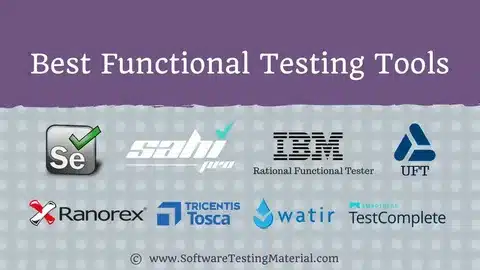In 2025, software testing tools are evolving faster than ever. From AI‑powered, codeless platforms to cutting‑edge frameworks for end‑to‑end testing, the right tool can dramatically shorten release cycles and improve quality. Whether you’re aiming to automate API validation, cross‑browser UI checks, or enterprise risk‑based testing, this blog covers the 7 best software testing tools for 2025. We dig into their strengths, ideal use‑cases and how they integrate with CI/CD workflows. We also highlight how ChromeQALab can streamline adoption. Read on to simplify selection, boost productivity, and stay ahead in quality assurance.
Top 7 Software Testing Tools to Try in 2025
1. ACCELQ – AI‑Powered Codeless Platform
ACCELQ leads the AI‑augmented test automation wave by enabling unified coverage across web, mobile, API, desktop and backend applications. It auto‑generates test cases, self‑heals when UI elements change, and uses business‑process modelling to drive test design.
Best for teams seeking low‑code, fast ramp‑up automation that integrates seamlessly with Agile and DevOps pipelines.
2. Playwright – Modern End‑to‑End Testing Made Reliable
Microsoft’s Playwright is now considered the top open‑source choice in 2025 for end‑to‑end web testing. It supports Chromium, Firefox, WebKit and offers automatic waiting, network control and parallel execution, reducing flaky tests dramatically.
Perfect for JavaScript, Python or C#‑based dev teams building modern web apps.
3. Selenium – The Tried‑and‑True Automation Workhorse
Selenium remains foundational in cross‑browser automation. Supporting Java, Python, C#, Ruby, Scala and more, Selenium WebDriver and Grid offer scalable, open‑source automation across platforms.
Ideal for experienced dev and QA teams needing highly customizable, scalable browser automation.
4. Cypress – Fast, Developer‑Friendly UI Testing
Cypress continues to gain traction as a JavaScript‑first framework with excellent debugging capabilities and fast feedback loops. Its architecture runs directly in the browser, giving developers real‑time reloading and reliable execution.
Great pick for frontend teams working in JS frameworks who want fast UI validation without WebDriver.
5. Katalon Platform – Hybrid Automation for All Skill Levels
Built atop Selenium and Appium, Katalon provides visual recording, keyword‑driven scripting, API testing and CI integration. Its GUI plus script interface enables collaboration between technical and non‑technical testers.
Best for mixed teams needing automation across web, mobile, desktop and API testing with minimal setup.
6. Tricentis Tosca – Enterprise Model‑Based, Risk‑Based Testing
Tosca’s model‑based approach decouples test logic from UI implementations, minimizes script maintenance and offers risk‑based test design. Analytics help prioritize test execution and optimize coverage.
Suited for large enterprises with complex, regulated systems looking to maximise test ROI.
H3: 7. SoapUI / ReadyAPI – Mature API & Web Services Testing
SoapUI (open‑source) and its commercial version ReadyAPI provide robust functional, security, compliance and mock‑testing for SOAP and REST services. ReadyAPI enhances productivity with WSDL refactoring, reporting and team features.
Essential for platforms where API quality underpins business logic or microservices.
How ChromeQALab Can Help Streamline Adoption of Software Testing Tools
ChromeQALab supports organizations in selecting and onboarding the right software testing tools by offering tailored training and consulting. We help map your tech stack and team capabilities to tools like ACCELQ, Playwright or Katalon, enable CI/CD integration best practices, and design maintainable test frameworks. Our approach includes migration support from legacy tools, coaching on self‑healing test design and periodic audits to maximise ROI. Whether your focus is API automation, cross‑browser UI testing or enterprise risk management, we help you adopt tools faster and more effectively.
Conclusion
In 2025, testing is no longer just about executionit’s about speed, adaptability and quality intelligence. Whether you choose ACCELQ for AI‑powered codeless automation, Playwright for reliable end‑to‑end web tests, Selenium for highly customizable browser automation, or enterprise tools like Tricentis Tosca and ReadyAPI, each shines in its niche. With strong CI/CD support, self‑healing features, and cross‑platform coverage, these top 7 software testing tools help teams scale smarter and release faster. Pair tool selection with expert onboarding from ChromeQALab, and you’ll deliver consistent quality with greater efficiency.
FAQs
What’s the difference between Selenium and Playwright?
Selenium is a mature, open‑source framework supporting many languages via WebDriver. Playwright is newer, built for modern web apps: it auto‑waits, supports multiple browsers natively, offers network controls and parallel execution, and typically yields faster, more stable tests.
Is ACCELQ suitable for non‑technical teams?
Yes, ACCELQ’s intuitive visual interface and AI‑driven test generation make it accessible to QA teams with minimal coding experience. It supports unified automation across web, mobile, API, desktop and backend workflows.
Can Katalon replace Selenium or Appium entirely?
Katalon builds upon Selenium and Appium under a unified GUI. It supports recording, scripting, API testing, execution on cloud platforms and CI pipelines. For many mixed‑skill teams, it serves as a complete wrapper for multiple automation needs.
Which tool is best for API testing?
For API‑centric testing, SoapUI/ReadyAPI offers mature support for REST, SOAP, message mocking, compliance and reporting. ACCELQ and Katalon also support API flows within broader automation scenarios.
Do these tools integrate with CI/CD pipelines?
Yes, all seven tools provide CI/CD integration. ACCELQ, Playwright, Selenium, Cypress, Katalon, Tosca and ReadyAPI can work with Jenkins, GitLab CI, Azure DevOps, Bamboo and more for automated test execution within release pipelines.
Are AI‑based testing tools still brittle?
Modern AI tools like ACCELQ (self‑healing, business‑model driven), Katalon smart handlers and Tosca’s risk‑based logic significantly reduce flaky failures. However, governance and version control remain essential to prevent drift over time.

